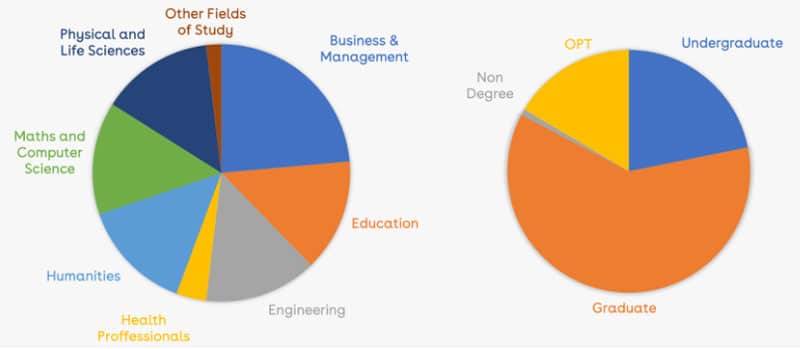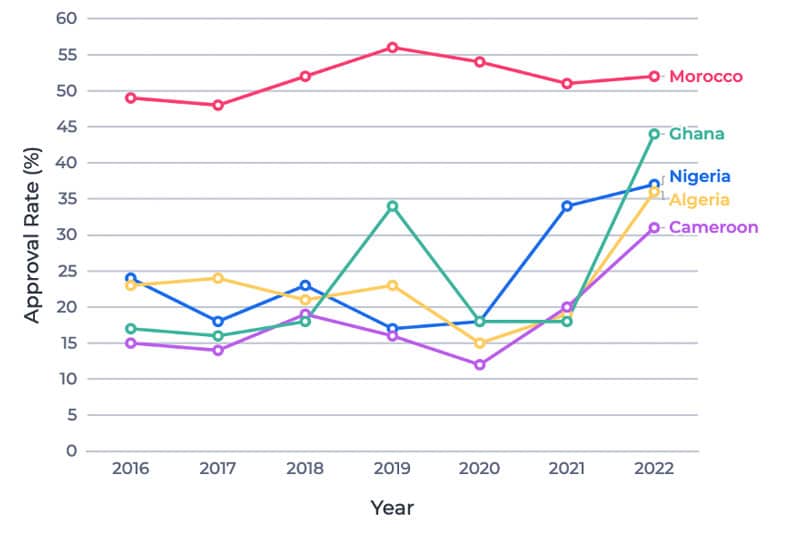Ghanaian students are intent on study abroad but currency woes present a challenge
- Ghana is now a Top 20 student market for Canada and a Top 25 market for the US
- Many Ghanaians want to study in the US, but the cedi’s fall against the dollar is making this more challenging
- Ghanaian students tend to be highly proficient in English and invest heavily in preparing for the tests and grades required for study abroad
Ghana’s ascent as a key emerging student market is well illustrated by recent enrolment growth in leading destinations. For example:
- Ghana first made it into Canada’s Top 20 in 2023, with enrolment gains of 167% over 2022. There were 13,005 Ghanaian students in Canadian education institutions at the end of 2024, up from 9,205 in 2023 (+41%) and just over 2,000 in 2019 (+534% growth overall).
- In the US, according to the SEVIS by the Numbers report for 2024, Ghana entered the Top 20 higher education sending markets for the first time ever (14,937 students), joining Nigeria (27,948) as the other Sub-Saharan African country in this top tier.
- Ghanaian student numbers were up by 47% y-o-y in the UK in 2021/22 for a total of 3,925, following a 22% increase the previous year.
Globally, there are more than 30,000 Ghanaian students abroad this year.
Market fundamentals are strong, as is demand for study abroad
Ghana is one of Africa’s most stable democracies. Peaceful transfers of power are the norm; a coup d’état hasn’t occurred since the 1990s. The country scores well on the Freedom House’s Global Freedom Index (whose methodology includes factors such as freedom of expression and equality before the law), though discrimination against women and especially those identifying as LGBTQ is a persistent issue.
More than half of the population of almost 35 million is under the age of 25, and Ghanaian youth benefit from a no-tuition policy for public primary and secondary education. English is the official language, and Ghanaians rank 4th in Africa and 34th in the world on the EF English Proficiency Index. This, paired with Ghanaians’ tendency to study hard to increase their chance of being accepted to universities abroad, makes Ghanaian students generally excellent candidates for foreign bachelor’s and graduate programmes abroad.
That said, Ghana is mostly a graduate market. In a recent IDP Connect webinar focusing on Nigeria and Ghana, Marie Stella Tsetse, IDP’s country manager for Ghana, noted that most Ghanaians obtain their bachelor’s from a university in the country and then look for graduate opportunities abroad. However, she also said that the demand for foreign education is so strong that if a Ghanaian bachelor’s student did not receive funding for study abroad the first year they applied for it, they would try one or two more times more while enrolled in a Ghanaian institution. If successful on one of those successive attempts, many students would drop their studies in Ghana – even if they were in their second or third year of their bachelor’s – and start again in their first year at a foreign institution.
Ms Tsetse explained that Ghanaian families prioritise education and are ever-more interested in sending their children abroad. Students tend to invest in private tutoring to increase their score on admission tests such as the SAT and their chances of receiving a scholarship.
The following IDP slide shows top areas of demand for Ghanaian students looking at studying in the US

Need for scholarships is higher than usual
Scholarships are especially important for Ghanaian students at the moment. High inflation is a problem, but even more, the currency (the cedi) is in serious trouble against the US dollar. Bloomberg described it as a “record-breaking weakening” this month. Students are looking for 50%-100% of their tuition, living costs, and flights to be covered – with 100% necessary for many.
Unfortunately, said Ms Ttetse, students may find it more difficult this year to obtain a scholarship from the Ghanaian government. This is because the current government may have little left in its coffers as it nears the end of its eight-year term (the election is scheduled for 7 December). Ms Tsetse explained that a trend is for a new government to begin spending more freely by its second year in power. In the meantime, institutions may want to establish or expand targeted scholarships for Ghanaian students to be competitive in a country where so many universities are increasing their presence.
Visa issues are a significant barrier
Ms Tsetse noted that many Ghanaian students are thwarted in their aim of studying in the US due to their visas being rejected. Many of those applying to Canadian institutions also encounter visa issues, though as the chart below from ApplyBoard shows, visa approvals have been increasing significantly for Ghanaians.

Institutions would be well advised to increase the support they provide to Ghanaian applicants in terms of submitting complete visa applications, meeting deadlines, and troubleshooting in general. Ms Tsetse suggested that such supports should happen early in the recruiting cycle, as students want to be assured of funding at least six months before application deadlines.
Because of the cedi’s fall against the US dollar (and also other world currencies), budgetary counselling and help with locating financial aid/scholarships and affordable accommodation are also increasingly important services to provide to Ghanaian students.
For additional background, please see:
















